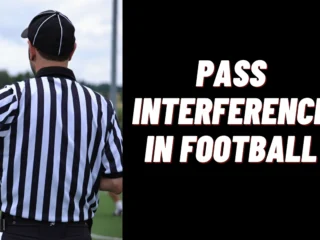Pass interference can be a significant factor in the outcome of any football match. It’s a regular penalty, which is usually used at the high school, college and professional football games. What makes pass interference important?
Pass interference is when a defensive player blocks an offensive player from taking the ball. The ruling states the defensive player is not allowed to touch the offensive player when the ball is in the air. If the defensive player makes contact so, it is deemed to be pass interference.
This article will go over everything you require about pass interference.
Defensive Pass Interference
Defensive pass interference calls could drastically alter the flow of any football game. This rule was established in the days of forward passes being allowed.
The pass interference rule was enacted to give players who are trying to catch the ball the ability to catch it with no player interfering.
There are several reasons why the official could throw a flag to stop a pass.
Pass interference happens when two people are trying to catch the ball however one of them is too insecure. It is often the case that the referee throwing the penalty flag.
The offensive player should be allowed to catch the ball.
However the defensive player enjoys the same rights to the football as offensive players. If the defensive player is looking back at the football and in a place where they are able to grasp it, they may attempt to capture it.
Also check: AB de Villiers | Abhinav Bindra
The penalty flag is typically used when a defensive player fails to make an effort to be in position to kick the ball into the air. They have too much contact to the wide receiver and result in a penalty flag.
Penalty For Pass Interference
If the official from football decides that the player on the defense is making too much contact with the wide receiver, they will wave the flag and will not attempt to catch the ball.
The penalty flag is different according to the level of play. These are the penalties that each football league will have.
- High School 15 Yard Penalty at the Line of Scrimmage
- College: 15 Yard Penalty from the Line of Scrimmage and an Automatic First Down
- Professional Automatic First Down The Ball Is Located Where the Penalty was Committed
As you will see, the penalty for interference in the pass is much more than on the professional side than at the college and high school levels.
High school pass interference may not necessarily mean that it’s a first down. According to NFHS guidelines when the offense has 3rd and 20, and pass interference occurs during the next play, the team is required to replay the down, which will be 3rd and 5.
It’s safer to do it in the college. The official will then throw a penalty flag for 15 yards, and the team will be automatically given a first down.
Rules for pass interference at the professional level, such as the NFL are among the most rigorous. They require that when the flag of penalty is thrown for pass interference, the ball is immediately placed in the spot where the pass interference occurred. The offense also gets an automatic first down.
This call had numerous implications for teams who were who were trying to get the ball across the field after games.
The pass interference call is frequently contested by players, fans and coaches.
Offensive Pass Interference
While defense is usually called for pass interference, there’s an offensive pass interference penalty also.
This link gives a fantastic visual representation of offensive passing interference.
If the ball is still floating in the air, an offensive player could be penalized for offensive pass interference in the event that they are able to make contact with it or attempt to block the ball.
The consequence of offensive interference with a pass is that the penalty of 15 yards for offense.
If the penalty occurred on a play that was 2nd or 10, it will be 25 or 2nd. This is only the case if the penalty is recognized by the defense (high school and college).
This is a relatively rare penalty however, it is possible to get it. Pass interference is usually dependent on the referee’s discretion. Although some referees may not raise a flag, others may. It is all dependent on the interpretation of the referee’s pass interference.
Also check: Anjali Bhagwat | Anju Bobby George
